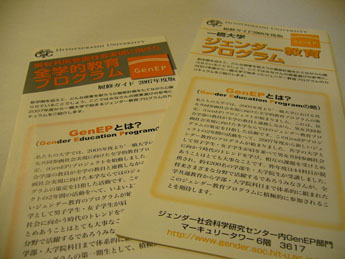Kimiko KIMOTO
Professor, Hitotsubashi University
Kazuko TANAKA
Professor, International Christian University
【The article below is the same as the article that appears in the 11th issue of the CGS Newsletter.】
CGS: Today, Professors Kimiko Kimoto (KK) and Kazuko Tanaka (KT), shall discuss the future prospects for gender/sexuality pedagogy. Firstly, Professor Kimito could you tell us about Hitotsubashi's GenEP (a school-wide educational program for gender equity)?
KK: At Hitotsubashi University, students follow the curriculum set specifically for their chosen major to complete the credits required for graduation. Before the introduction of GenEP, individual lecturers voluntarily incorporated gender perspectives in their classes since there were no required gender-related courses. But with GenEP, we created for the first time an official system of gender-related courses and offered a list of such courses for students. Every year we make a new program of gender-related coursework that enables students to systematically study gender issues. The program is administered by the Center for Gender Research and Social Sciences (CGraSS).
*CGraSS Website: http://gender.soc.hit-u.ac.jp/index.html
Pedagogical Difficulties in Gender/Sexuality Studies
KT: The notion of "gender" itself has been continuously challenged and is developing quickly, so I think we must catch up with the progression. For instance, in introductory classes you teach your students to question such assumptions as "biological sexual difference" and explain how the debate over gender/sex distinction has developed to the extent that sex is always already gender. But in some cases, when talking about real-life social issues, it's necessary to speak of gender differences in terms of men and women, like when discussing explicit gender-based discrimination. So, that's when....
KK: But you don't want to strategize your opinion..., do you?
KT: Right, I want to see things as complicated as they are.... We must look at the historical contexts of each case, in which these complexities lie. And we must not simplify them....
KK: I agree. The most difficult aspect of learning for students is to incorporate the experience and knowledge they've acquired in their daily lives to their study. So it's not the need to keep up with the most radical and recent theories that's important, but rather, the process of development and the accumulation of theories by students ... I think the theoretical sublimation of gender studies has departed from its primitive concerns and...probably made itself into a closed community..., what do you think?
KT: Well, I don't think it's about theoretical sublimation and closed communities..., but the problem is, feminist theories to date have only been concerned about a particular population, such as heterosexual women whose universality has been taken for granted.
KK: Yes, and Caucasian women, middle-class women.
KT: Right. And now, we're accused of reducing all the complexities to a single womanness declaring "w're women" ...So I'd call it a process of liberation and awareness-raising rather than theoretical sublimation.
KK: Oh, liberation. I see, I see.
KT: And this process is totally dynamic and questions the past discourses that have been based on the exclusion of those who differed from the image of the "ideal woman." So I think it's important to speak for oneself and not seek to speak for others (laugh).
KK: Yes, I see. But, younger generations are plunged into a number of already-accumulated discourses. And they compulsively force themselves to catch up and learn the language. The problem is that, during this process, some of them tend to indulge in political correctness and only excel at telling what can be said and what not. They are bound by these rules and unable to speak freely or critically.
KT: They don't want to make mistakes, right?
Learning Through Teaching
KT: I used to think that I knew and understood the issues of sexual minorities and sexual harassment. But through conversations with sexual minority students, I'd often be surprised saying, "how ignorant I am!" And when I talked with victims of sexual harassment, I felt stupid. "What did I think I knew!?" I didn't mature in this regard by myself, but with other people's help. I've learned so much from others. So even when I invested all my efforts and time and energy to start CGS - it took five years in total - I didn't feel exhausted. Rather, I was glad I could give "back" something to those from whom I learned, though not directly to "them" specifically. It was an inevitable result of thinking deeply about what I could do for them.
KK: Oh, I see. I think I can relate to that too. When I started teaching at Hitotsubashi, there was no gender-related course, so most students didn't know the word "gender." On the first day of class, many students came but they looked skeptical like they were trying to see what the class would be like. But as I began talking, I realized that there were two types of students: the one who begins to withdraw and look unexcited, and the other who leans forward to listen (laugh). After the class, some students, male and female, came up to ask me questions. Some of the responses I got from the unexcited group were also interesting. One of them said, "I hate your class, but I know that I must keep my eyes open and learn this stuff."
KT: Wow.
KK: So, I guess I learned a lot from my students, too. Before I initiated the sexual harassment guidelines, I conducted a student survey and realized that many cases had not been reported, which made me feel more compelled to finish the guidelines and start GenEP, you know, bottom-up activism with everyone's help. So in the following four years, including the two years for preparation, my life changed drastically. Now I have friends who are willing to work with me, not for money or fame. Undergraduate and graduate students are very supportive, too. Even though I wasn't particularly thinking about "giving back," now I realize it's important for students to develop their ideas while they are still young, especially in times like these in the face of such a strong backlash movement.
Empowerment Through Networking
KT: I am thinking of creating some kind of network with institutions outside the campus, and maybe a unit-transfer system with them. Even if there are only a few faculty members who study gender studies proper, they don't have to cower down and can feel supported by the network (laugh). I came up with this idea because of the success of the nation-wide network against sexual harassment on campus. There are limits to what you can say when you are alone, but the network allows you to learn how to think about issues with other people, listen to victims of sexual harassment, and learn to speak up and demand. One of the consequences was the sexual harassment guidelines ICU. So I realized how much difference it makes in what you can say and how much you can say to have a supporting network backing you. Maybe even in a school where there are few faculty members in Gender Studies, if you have a supporting network that you can trust, you will be able to speak up more freely and be heard. And hopefully, the network will affect the employment behavior of schools..., well, I'm just imagining, too optimistically (laugh).
KK: Are you talking about something like academic associations?
KT: What I'm talking about is a network that brings together the curricula of different graduate schools, so graduate students can take courses for credit outside their home university. So students can identify with their affiliation to the Gender Studies major rather than to a particular university.
KK: Teachers tend to be scattered in different universities and do not have active relations with faculty members from other institutions.... What I am currently thinking of doing in future is a symposium that will connect and fuel such Gender Studies teachers, where they will discuss pedagogical practice and the ways students re influenced by or distance themselves from gender pedagogy.
T: That's exactly what CGS is going to do next year.
K: What? Really?
KT: First of all, we will invite people from the neighboring area and have meetings semi-monthly, you know, starting slowly. And eventually, the final meeting will probably be an open symposium. I am not sure yet when and where, but we'll see. We must break free from this suffocating, isolating situation. We should do it together!
KK: Oh, definitely! Recently I've been thinking about class issues. Our graduates tend to think the elite world is the be all and end all. So there's a tendency to ignore the lower classes even in research. But in these times where society is more divided than ever, gender analysis per se is not sufficient. I think it's our task, as educators, to make change. Students are much more aware of reality than we think they are, so we must learn from them, and pass it on. Knowledge alone is not enough.
Making Connections
KT: You know, there's always some kind of "dividing" force upon us, so we must have the power to resist it and connect with each other horizontally. So we need to be smart in that respect. And to do that, you should not seek to claim the "land" (a research center, a university, et cetera) as your own but do what you can where you are and when you can (laugh).
KK: Some classes are good only because the teachers are good. So when a teacher gets burned out and leaves, they are in trouble. So I think we need something that both connects us and energizes us. I think your idea is realistic and quite possible, you know, geographically and thus financially (laugh).
KT: I am thinking about the next 5 to 10 years until graduate schools are connected. So in the first 2 to 3 years, we should build a face-to-face network, share our ideas and create a sense of trust and mutual support.
KK: You mean once there is an already established organization, it serves as a base for activities and gives a sense of unity both outside and inside itself?
KT: Yes, we need a common image of what we are doing. Our goals, what's and how's. Just getting together won't mean anything. We need to use our imagination to think of the "next" step. I am glad that we can work on this together.
KK: Absolutely. Let's make it a success.